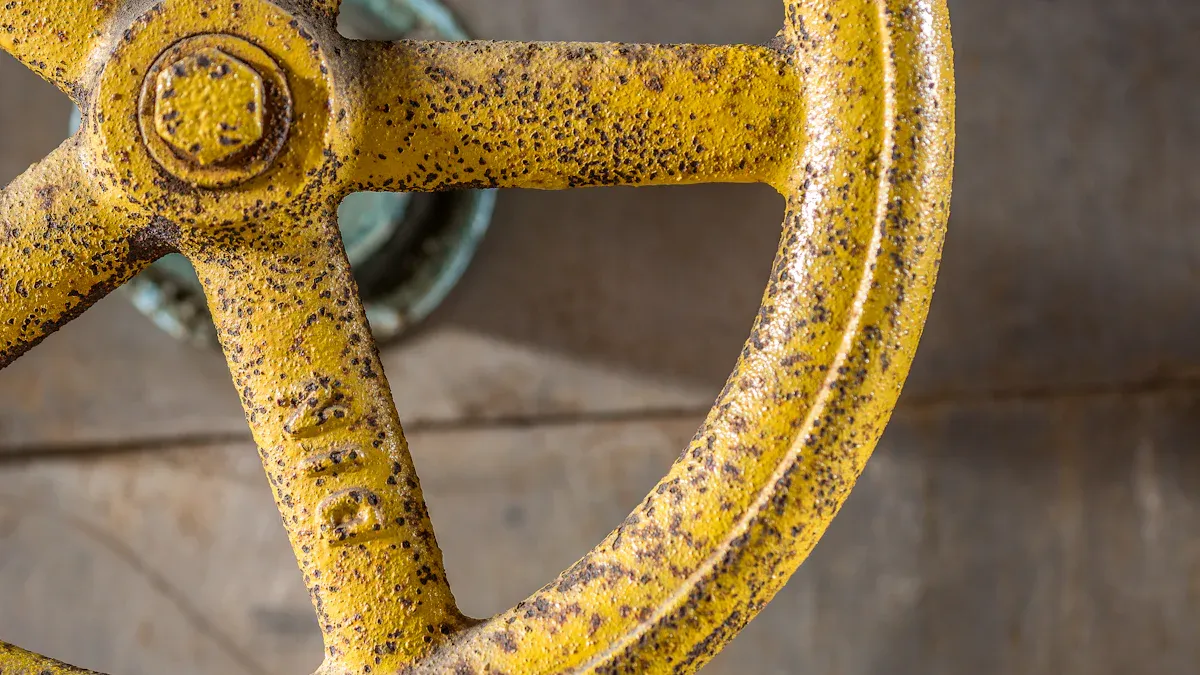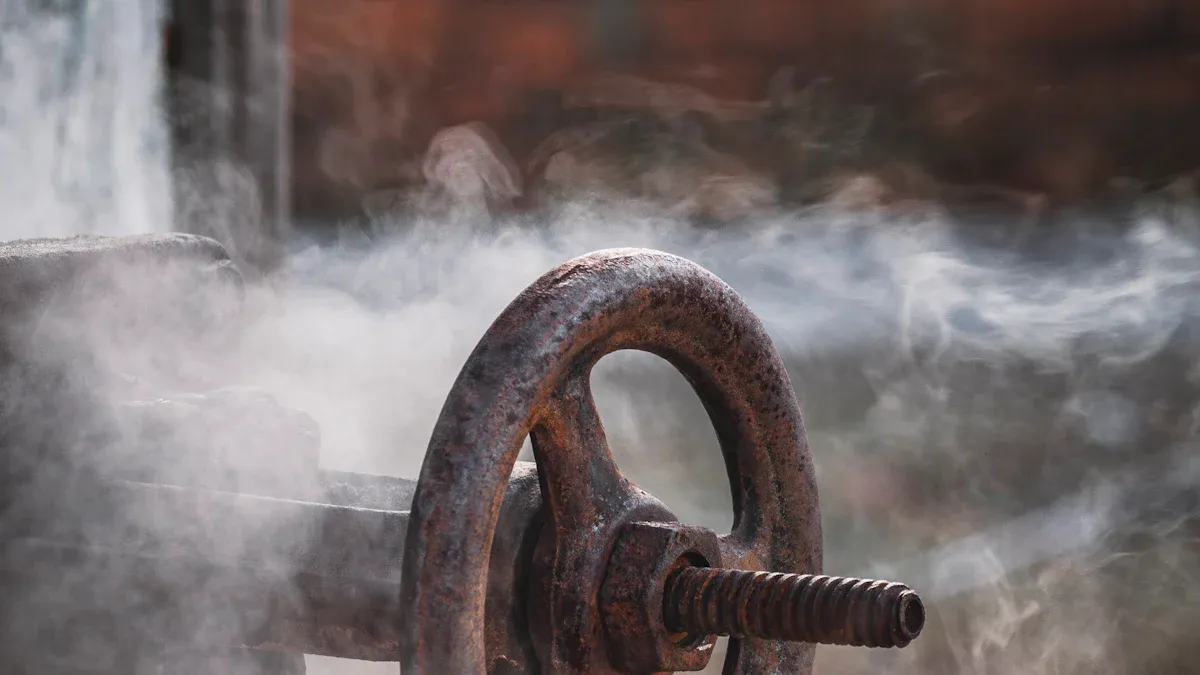close
Choose Your Site
Global
Social Media
Views: 0 Author: Site Editor Publish Time: 2025-07-15 Origin: Site









You often find cast iron handwheels in industries like manufacturing, transportation, and food processing. These handwheels control machines such as milling machines, lathes, valves, and pumps. Cast iron stands out for its high strength and ability to handle heavy-duty tasks. Many companies choose cast iron because it resists wear and solvents, making it perfect for harsh environments. Modern cast iron handwheels also offer chemical resistance and ergonomic designs for better comfort and safety.
The table below highlights why cast iron remains a top choice for handwheels in industrial settings:
| Reason for Use | Explanation |
|---|---|
| High Strength | Cast iron handwheels provide superior strength, often exceeding stainless steel, suitable for heavy-duty tasks. |
| Durability | They resist deformation and wear, making them reliable for frequent and precise adjustments. |
| Suitability for Large Sizes | Large diameter handwheels requiring heavier force are commonly made from cast iron due to its strength. |
| Application Versatility | Used across industries for valve control, machinery, printing, sewing machines, and more. |
Cast iron handwheels provide strong, durable control for heavy machinery across many industries like manufacturing, railways, and construction.
Their resistance to rust, chemicals, and wear makes them ideal for tough environments and long-term use.
Ergonomic designs and protective coatings improve comfort, safety, and performance during manual adjustments.
Regular cleaning and lubrication help maintain handwheels and prevent rust, ensuring smooth operation.
Customizable options allow businesses to get handwheels tailored to specific needs, boosting efficiency and safety.

You often see cast iron handwheels on machine tools in factories and workshops. These tools include milling machines, lathes, grinders, and presses. When you use these machines, you need to make precise adjustments or move heavy parts. Cast iron gives you the strength and durability needed for these tasks. The material resists deformation, so you can rely on it for accurate work over time.
Cast iron handwheels perform two main jobs:
Moving machine parts with steady force
Making fine adjustments for precision work
The diameter of the handwheel matters. Larger handwheels, usually made from cast iron, let you apply more force. Sometimes, you find crank handles attached to increase torque. This setup helps when you need extra power for making adjustments to a machine. The ergonomic design of modern handwheels makes them comfortable to use, even during long shifts.
Tip: Cast iron resists rust better than regular steel, especially when coated. This feature keeps your equipment working smoothly in tough environments.
The table below compares cast iron with other common handwheel materials:
| Material | Durability & Strength | Other Performance Characteristics |
|---|---|---|
| Cast Iron | High strength and durability; resists deformation | Great for large handwheels needing heavy force; available with protective finishes |
| Aluminum | Lighter than cast iron | Resists rust well; good for lighter tasks |
| Plastic | Durable; resists solvents and chemicals | Offers many grip and color options |
| Stainless Steel | Good chemical resistance | Can include special handles and grips |
| Steel | High strength | Less rust-resistant than stainless steel |
In many industrial applications, you use cast iron handwheels to control valves. These handwheels connect directly to the valve stem. When you turn the handwheel, you move the valve gate up or down. This action controls the flow of liquids or gases through pipes. Cast iron stands up to the pressure and stress found in these systems.
You often find these handwheels in industries like oil, gas, water treatment, and chemical plants. The handwheel acts as your main manual control for opening and closing a valve. In some cases, automated systems take over, but manual handwheels remain important for safety and backup.
Regular maintenance, such as cleaning and lubricating the handwheel, helps prevent rust and keeps the valve working smoothly. The solvent-resistant coatings on modern cast iron handwheels protect them from harsh chemicals and high temperatures.
You also see cast iron handwheels on presses and pumps, especially in heavy-duty settings. Adjustable stroke diaphragm pumps often use these handwheels to control the stroke length. By turning the handwheel, you can adjust the pump’s output while it runs. This feature gives you more control and flexibility during operation.
Cast iron parts in these pumps handle the stress and wear of daily use. The handwheel’s strength helps you make quick changes without worrying about damage. The vertical motion from the handwheel reduces wear on pump parts and extends their life. You get reliable performance and less downtime.
Note: Cast iron’s resistance to rust and its ability to handle high temperatures make it a smart choice for equipment that faces tough conditions every day.

You see cast iron used throughout the railway industry. Rail operators rely on cast iron for manual controls in switches, brake systems, and signal levers. These controls must work in all weather conditions, from rain to snow. Cast iron resists rust, so you get reliable performance even when exposed to moisture and outdoor elements. When you operate a railway switch or adjust a brake, you need a material that will not deform or fail under pressure. Cast iron delivers the durability and stability required for these critical safety tasks. Its resistance to rust means less maintenance and fewer replacements, which keeps trains running safely and on time.
Construction sites demand tough materials. You often find cast iron handwheels on cranes, concrete mixers, and heavy-duty hoists. These machines require frequent manual adjustments, sometimes under heavy loads. Cast iron stands out because it resists rust and handles high torque without bending or breaking. When you are making adjustments to a machine, you want a handwheel that will not slip or wear out quickly.
Cast iron handwheels are stronger than stainless steel. This strength allows them to withstand the heavy forces found in construction machinery. You can trust them for tasks like calibrating equipment or controlling large valves.
Here is a table showing why cast iron is the preferred choice in construction equipment:
| Aspect | Role or Requirement |
|---|---|
| Material and Strength | Cast iron handwheels provide high strength and durability for heavy-duty applications. |
| Durability and Force | They resist deformation and handle high torque, perfect for demanding environments. |
| Safety Features | Safety clutches protect you by preventing unwanted rotation during operation. |
| Ergonomics | Handle designs reduce hazards and improve comfort during use. |
| Mounting and Torque | Secure mounting ensures reliable operation and effective torque transmission. |
| Industry Standards | Compliance with ANSI, OSHA, and other standards ensures safety and performance. |
You benefit from cast iron’s ability to resist rust, which is essential on dusty, wet, or muddy job sites.
Farmers and agricultural workers depend on cast iron for equipment like seeders, plows, and irrigation pumps. These machines operate outdoors, often exposed to rain and chemicals. Cast iron resists rust, so you spend less time on maintenance. When you adjust settings or control flow rates, you need a handwheel that will not corrode or seize up. Cast iron’s ruggedness means you can keep working, season after season, without worrying about breakdowns. Its resistance to rust and ability to handle repeated use make it a smart choice for the tough conditions found on farms.
You often find cast iron in HVAC systems because it stands up to tough conditions. When you adjust dampers or valves, you need a material that will not give in to rust. Cast iron resists rust even when exposed to moisture and changing temperatures. You can trust it for manual controls in air handling units and large building ventilation systems.
Proper maintenance keeps your cast iron handwheels working smoothly. Follow these steps for best results:
Install valves upright so you can reach the handwheel easily.
Support extension spindles with wall mounts to avoid stress on the valve stem.
Never use the handwheel for lifting or let it take a hit.
Check for misalignment between valve and piping to prevent extra stress.
Clean the valve’s inside and sealing surfaces before installation.
Lubricate moving parts often to stop rust and keep things moving.
Adjust packing glands after installation to prevent leaks.
Turn the valve once a month if you do not use it often.
Release system pressure before any maintenance.
Inspect and replace seals as needed.
Test the valve after installation to make sure it works right.
Regular care helps you avoid rust and keeps your HVAC system safe and reliable.
You sometimes see cast iron in heavy-duty food processing machines. These machines need strength to handle big loads. Cast iron resists rust better than many metals, especially when coated. However, food processing often requires strict hygiene. Stainless steel is usually the top choice because it does not rust and is easy to clean.
| Handwheel Material | Typical Application Areas | Hygiene and Chemical Resistance Requirements |
|---|---|---|
| Cast Iron | Heavy-duty machinery | Can be coated for rust resistance; not always best for food hygiene |
| Stainless Steel | Food and beverage | Does not rust; easy to keep clean |
| Aluminium | Lightweight equipment | Resists rust; less focus on hygiene |
If you use cast iron, make sure it has a protective coating. This helps prevent rust and makes cleaning easier. Customization options, like rounded edges or special coatings, can improve safety and hygiene.
You find cast iron in laboratory equipment that needs precise control. Microscopes, spectrometers, and centrifuges often use cast iron for their adjustment wheels. The weight and strength of cast iron help you make fine adjustments without slipping. You get more control and less risk of rust, especially if you keep the equipment clean and dry.
Cast iron gives you three main benefits in the lab:
High precision for small adjustments
Long-lasting durability
Strong resistance to rust, even with frequent use
Custom safety features, such as smooth edges and ergonomic grips, make cast iron handwheels safer and easier to use in labs.
When you need a handwheel that can handle tough jobs, cast iron stands out. You get exceptional strength, even more than stainless steel in many cases. This makes cast iron perfect for heavy-duty tasks like adjusting machinery or calibrating equipment. Many industries trust cast iron handwheels because they resist deformation and wear, even after years of use. For example, table saws and other demanding machines use cast iron handwheels to improve safety and efficiency. You can rely on these handwheels to last, thanks to their robust construction and proven track record in challenging environments.
You often work in places where chemicals or solvents are present. Cast iron handwheels, especially those from Foshan Grace Machinery Co., Ltd., offer a durable finish that protects against harsh substances. The special coatings on these handwheels provide rust resistance and allow them to withstand high temperatures up to 200°C. This means you can use them in metalworking, manufacturing, or chemical plants without worrying about damage. The ergonomic design also makes them comfortable to use, even when you need to make precise adjustments in tough conditions.
Tip: Choose cast iron handwheels with solvent-resistant coatings for extra protection in environments with frequent chemical exposure.
You want equipment that saves money over time. Cast iron handwheels give you that advantage. Their strength and longevity mean you replace them less often, which lowers maintenance costs. In large-scale industrial settings, this cost benefit becomes even more important. Cast iron offers a balance between economy and performance, making it a smart choice for many businesses. When you invest in a cast iron handwheel, you get a product that stands up to heavy use and delivers reliable results year after year.
You see cast iron handwheels in manufacturing, transportation, and engineering. These tools give you precise control over valves, gear operators, and machinery. Cast iron stands out for its strength, chemical resistance, and long life. Many industries choose cast iron for its ability to handle tough jobs and support manual adjustments. New trends focus on ergonomic design, smart features, and eco-friendly materials. When you select high-quality, customizable cast iron, you invest in safety, efficiency, and future-ready solutions.
You get high strength and long-lasting durability with cast iron handwheels. They resist wear, chemicals, and heat. This makes them ideal for heavy-duty machines and tough environments.
You should clean the handwheel regularly and apply lubricant to moving parts. Check for rust or damage. If you spot any issues, address them quickly to keep your equipment running smoothly.
Yes! Many manufacturers, like Foshan Grace Machinery Co., Ltd., offer custom sizes, coatings, and ergonomic features. You can request handwheels with or without handles, special finishes, or safety designs.
Cast iron handwheels with solvent-resistant coatings protect against harsh chemicals. You can use them safely in chemical plants, labs, or any place where chemical exposure is common.
You find them in railways, construction equipment, HVAC systems, and even some laboratory devices. Their strength and reliability make them useful in many commercial and utility settings.